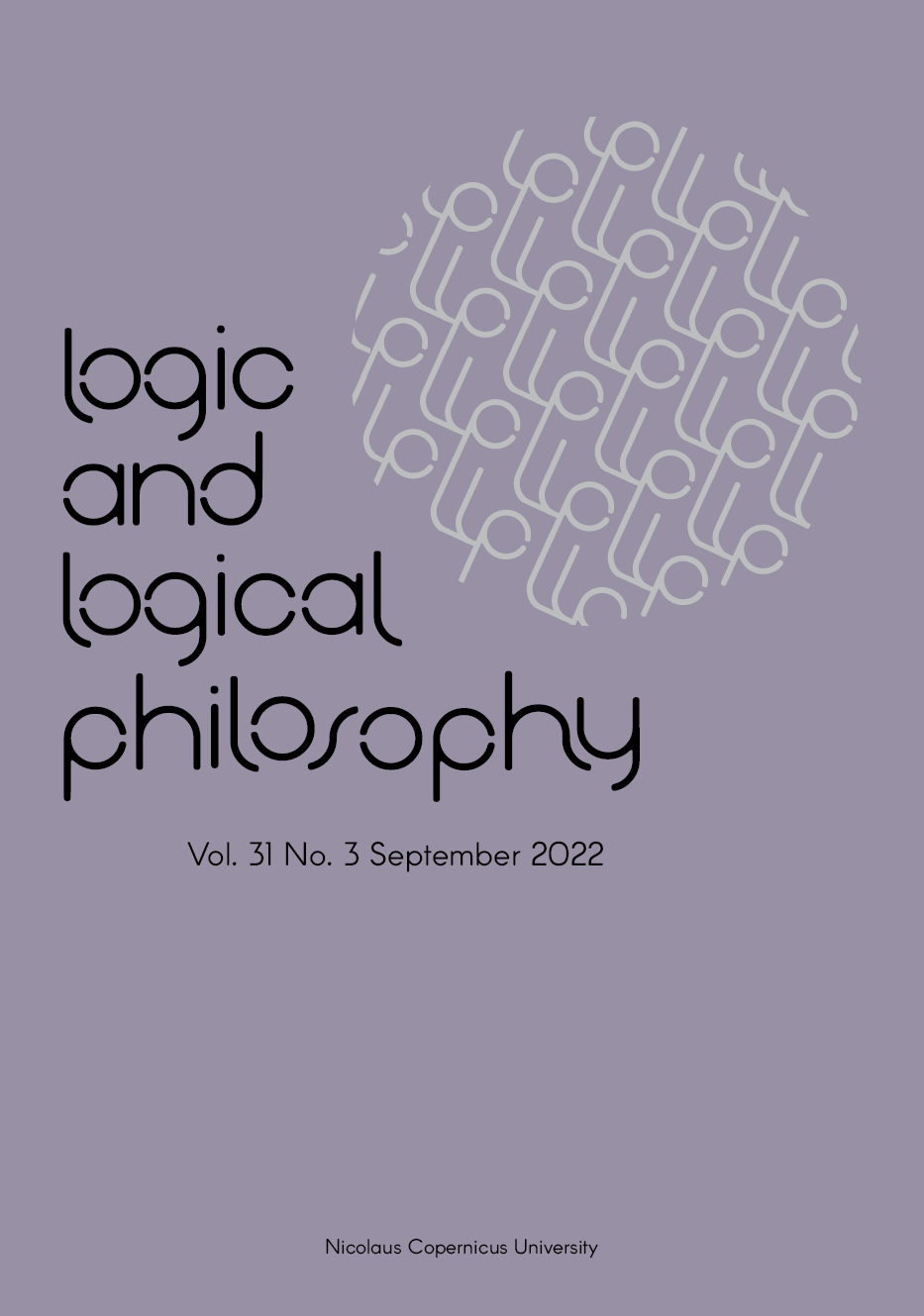Analysis of Penrose’s Second Argument Formalised in DTK System
DOI:
https://doi.org/10.12775/LLP.2021.019Keywords
Penrose’s second argument, Gödel’s disjunction, DT system, DTK system, computational model of mind, arguments in favour of the first horn of Gödel’s disjunctionAbstract
This article aims to examine Koellner’s reconstruction of Penrose’s second argument – a reconstruction that uses the DTK system to deal with Gödel’s disjunction issues. Koellner states that Penrose’s argument is unsound, because it contains two illegitimate steps. He contends that the formulas to which the T-intro and K-intro rules apply are both indeterminate. However, we intend to show that we can correctly interpret the formulas on the set of arithmetic formulas, and that, as a consequence, the two steps become legitimate. Nevertheless, the argument remains partially inconclusive. More precisely, the argument does not reach a result that shows there is no formalism capable of deriving all the true arithmetic propositions known to man. Instead, it shows that, if such formalism exists, there is at least one true non-arithmetic proposition known to the human mind that we cannot derive from the formalism in question. Finally, we reflect on the idealised character of the DTK system. These reflections highlight the limits of human knowledge, and, at the same time, its irreducibility to computation.
References
Avron, A., 2020, “The problematic nature of Gödel’s disjunctions and Lucas-Penrose’s thesis”, Studia Semiotyczne 34 (1): 83–08. DOI: https://doi.org/10.26333/sts.xxxiv1.05
Chalmers, D. J., 1995, “Minds, machines, and mathematics: A review of Shadows of the Mind by Roger Penrose”, Journal Psyche 2 (June): 11–20.
Ebbinghaus, H. D, J. Flum and W. Thomas, 1984, Mathematical Logic, New York Berlin Heidelberg Tokyo: Springer Verlag.
Feferman, S., 1962, “Transfinite recursive progressions of axiomatic theories”, The Journal of Symbolic Logic 27: 259–316. DOI: https://doi.org/10.2307/2964649
Feferman, S., 1995, “Penrose’s Gödelian argument: A review of Shadows of the Mind by Roger Penrose”, Journal Psyche 2 (May): 21–32.
Feferman, S., 2008, “Axioms for determinateness and truth”, The Review of Symbolic Logic 1 (2): 204–217. DOI: https://doi.org/10.1017/S1755020308080209
Gentzen, G., 1969, “New version of the consistency proof for elementary number theory (1938)”, pages 252–286 in M. E. Szabo (ed.), The Collected Papers of Gerhard Gentzen, Amsterdam: North-Holland.
Gödel, K., 1972, “On an extension of finitary mathematics which has not yet been used”, pages 271–280 in S. Feferman et al. (eds.), Collected Works, Volume II: “Publications 1938–1974” (1990), New York: Oxford University Press.
Gödel, K., 1995, “Some basic theorems on the foundations of mathematics and their implications” (1951), pages 304–323 in S. Feferman et al. (eds.), Collected Works, Volume III: “Unpublished Essays and Lectures”, New York: Oxford University Press.
Halbach, V., 2014, Axiomatic Theories of Truth, Cambridge: Cambridge University Press.
Koellner, P., 2016, “Gödel’s disjunction”, pages 148–188 in L. Horsten and P. Welch (eds.), Gödel’s Disjunction: The Scope and Limits of Mathematical Knowledge, New York: Oxford University Press.
Koellner, P., 2018a, “On the question of whether the mind can be mechanized, I: From Gödel to Penrose”, The Journal of Philosophy CXV, 7: 337–360. DOI: https://doi.org/10.5840/jphil2018115721
Koellner, P., 2018b, “On the question of whether the mind can be mechanized, II: Penrose’s New Argument”, The Journal of Philosophy CXV, 7: 453–484. DOI: https://doi.org/10.5840/jphil2018115926
Krajewski, S., 2020, “On the anti-mechanist arguments based on Gödel theorem”, Studia Semiotyczne 34 (1): 9–56. DOI: https://doi.org/10.26333/sts.xxxiv1.02
Leitgeb, H., 2009, “On formal and informal provability”, pages 263–299 in O. Bueno and Ø. Linnebo (eds.), New Waves in Philosophy of Mathematics, London New York: Palgrave Macmillan.
Lindström, P., 2001, “Penrose’s new argument”, Journal of Philosophical Logic 30 (3): 241–250. DOI: https://doi.org/10.1023/A:1017595530503
Lindström, P., 2006, “Remarks on Penrose’s new argument”, Journal of Philosophical Logic 35 (3): 231–237. DOI: https://doi.org/10.1007/s10992-005-9014-7
Lucas, J. R., 1961, “Minds, machines and Gödel, Philosophy 36: 112–127. DOI: https://doi.org/10.1017/S0031819100057983
Lucas, J. R., 1968, “Satan stultified: a rejoinder to Paul Benacerraf”, The Monist 52: 145–158. DOI: https://doi.org/10.5840/monist196852111
Mancosu, P., 1998 (ed.), From Brouwer to Hilbert. The Debate on the Foundations of Mathematics in the 1920s, New York: Oxford University Press.
Mancosu, P., 1999, “Between Vienna and Berlin: the immediate reception of Gödel’s incompleteness theorems”, History and Philosophy of Logic 20: 33–45. DOI: https://doi.org/10.1080/014453499298174
Nelson, E., 1986, Predicative Arithmetic, Mathematical Notes 32, Princeton University Press: Princeton, New Jersey.
Penrose, R., 1989, The Emperor’s New Mind. Concerning Computers, Minds, and the Laws of Physics, New York: Oxford University Press.
Penrose, R., 1994, Shadows of the Mind. A Search for the Missing Science of Consciousness, New York: Oxford University Press.
Penrose, R., 1996, “Beyond the doubting of a shadow. A reply to commentaries on Shadows of the Mind”, Journal Psyche 2 (23): 1–40. https://www.calculemus.org/MathUniversalis/NS/10/01penrose.html
Parsons, C., 1998, “Finitism and intuitive knowledge”, pages 249–270 in M. Schirn (ed.), The Philosophy of Mathematics Today, Clarendon Press: Oxford.
Shapiro, S., 1998, “Incompleteness, mechanism, and optimism”, Bulletin of Symbolic Logic 4 (3): 273–302. DOI: https://doi.org/10.2307/421032
Shapiro, S., 2003, “Mechanism, truth, and Penrose’s new argument”, Journal of Philosophical Logic 32 (1): 19–42. DOI: https://doi.org/10.1023/A:1022863925321
Sundholm, G., 1983, “Systems of deduction”, pages 133–188 in D. Gabbay and F. Guenthner (eds.), Handbook of Philosophical Logic, Vol. I, “Elements of Classical Logic”, Dordrecht/Boston/Lancaster: D. Reidel Publishing Company.
Tait, W., 1981, “Finitism”, The Journal of Philosophy 78: 524–546, DOI: https://doi.org/10.2307/2026089
Downloads
Published
How to Cite
Issue
Section
License
Copyright (c) 2021 Logic and Logical Philosophy

This work is licensed under a Creative Commons Attribution-NoDerivatives 4.0 International License.
Stats
Number of views and downloads: 1940
Number of citations: 0







